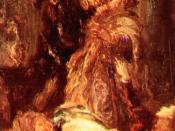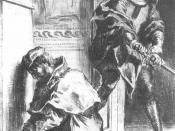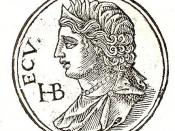THis speech occurs at the end of II,ii after Hamlet has witnessed a travelling player recite lines from an old play dealing with the destructiopn of Troy. The lines relate to the grief of queen Hecuba for her husband, King Priam, killed by Pyrrhus. Hamlet is so impressed by the emotion engenderted by the actor thta he becomes critical of his own behaviour in not having moved more decisively against Claudius. He describes himself as a 'rogue' and a peasant, - a person on the lowest rung of the social ladder. The element of 'conceit' or imagination involved in the player's performance is what especially annoys Hamlet with regard to himself. He gives a detailed description of the Player's acting and then exclaims 'All for nothing!' Hecuba's name is given three times to stress Hamlet's incredulity at someone being so moved by the plight of a figure from ancient mythology and leads on to the hyperbole of 'drown the stage with tears'.
This last point he applies to his own situation in the shortline 'Yet I' which forces the actor speaking pause before launching into the self condemnation of the next section.
Here the alliteration of 'muddy, mettled' adds to the impression of confusion with vivid verbs such as 'breaks,' 'plucks'and 'tweaks' supply metaphorical assaults suffered by Hamlet.
In describing claudius, Hamlet uses twowords, 'bloody'and 'bawdy',which sum up the king's evil nature as he is both a murderer and the seducer of Hamlet's mother. The repetition of 'villian' and the assonance of 'remorseless,treacherous,lecherous,kindless' provide a feeling of hysteria to the speech before Hamlet once more turns upon himself.
The speech ends with the phrase 'About my brains' after which Hamlet devises the plan to test the King's guilt by staging a play in which his crime will be represented.





